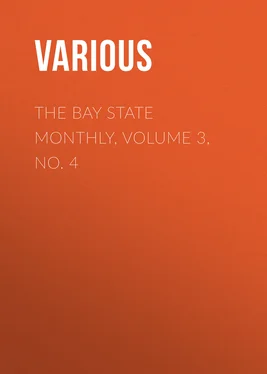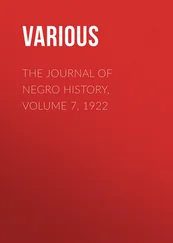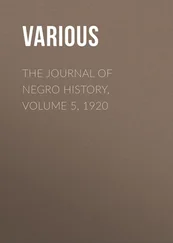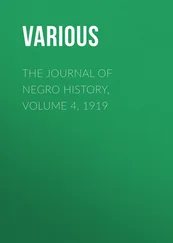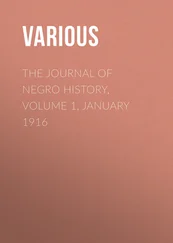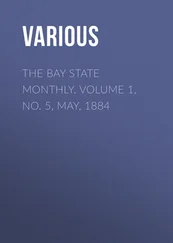Various - The Bay State Monthly, Volume 3, No. 4
Здесь есть возможность читать онлайн «Various - The Bay State Monthly, Volume 3, No. 4» — ознакомительный отрывок электронной книги совершенно бесплатно, а после прочтения отрывка купить полную версию. В некоторых случаях можно слушать аудио, скачать через торрент в формате fb2 и присутствует краткое содержание. Жанр: foreign_antique, periodic, foreign_edu, на английском языке. Описание произведения, (предисловие) а так же отзывы посетителей доступны на портале библиотеки ЛибКат.
- Название:The Bay State Monthly, Volume 3, No. 4
- Автор:
- Жанр:
- Год:неизвестен
- ISBN:нет данных
- Рейтинг книги:5 / 5. Голосов: 1
-
Избранное:Добавить в избранное
- Отзывы:
-
Ваша оценка:
- 100
- 1
- 2
- 3
- 4
- 5
The Bay State Monthly, Volume 3, No. 4: краткое содержание, описание и аннотация
Предлагаем к чтению аннотацию, описание, краткое содержание или предисловие (зависит от того, что написал сам автор книги «The Bay State Monthly, Volume 3, No. 4»). Если вы не нашли необходимую информацию о книге — напишите в комментариях, мы постараемся отыскать её.
The Bay State Monthly, Volume 3, No. 4 — читать онлайн ознакомительный отрывок
Ниже представлен текст книги, разбитый по страницам. Система сохранения места последней прочитанной страницы, позволяет с удобством читать онлайн бесплатно книгу «The Bay State Monthly, Volume 3, No. 4», без необходимости каждый раз заново искать на чём Вы остановились. Поставьте закладку, и сможете в любой момент перейти на страницу, на которой закончили чтение.
Интервал:
Закладка:
The conspiracy which, for a while at least, seemed destined to overcome all obstacles, was not confined to South Carolina or the Cotton States. Unfortunately it had established itself in the highest official circles of the National Government. Three members of President Buchanan's cabinet—Cobb, of Georgia, Secretary of the Treasury; Floyd, of Virginia, Secretary of War; and Thompson, of Mississippi, Secretary of the Interior—were rank and ardent disunionists. To the artful machinations of these three arch-traitors, who cared more for self than they did for the South, the success of the conspiracy was largely due. Grouped about them was a number of lesser functionaries, willing to lend their help. Even the President did not escape the suspicion of the taint of disloyal purpose.
The first and chief solicitude of the disunionists of South Carolina was to gain possession of the forts. A secret caucus was held. "We must have the forts," was its watchword; and, ere long, from every street corner in Charleston came the impatient echo: "The forts must be ours."
To revert to the beginning. On the 1st of October, 1860, the Chief of Ordnance wrote to Secretary Floyd, urging the importance of protecting the ordnance and ammunition stored in Fort Sumter, Charleston harbor, providing it met the approval of the commanding officer of Fort Moultrie. The Secretary had no objections; but the commanding officer of Fort Moultrie, while giving a very hesitating approval of the application, expressed " grave doubts of the loyalty and reliability of the workmen engaged on the fort ," and closed his letter (dated November 8th) by recommending that the garrison of Fort Moultrie should be reinforced, and that both Fort Sumter and Castle Pinckney should be garrisoned by companies sent at once from Fortress Monroe, at old Point Comfort. A few days later he ordered the ordnance officer at the Charleston office to turn over to him, for removal to Fort Moultrie, all the small arms and ammunition which he had in store. The attempt to make this transfer was successfully resisted by the Charleston mob.
This evidence of loyalty on the part of the commanding officer of the troops in Charleston harbor was not appreciated at Washington. His removal was promptly ordered by the Secretary of War. The officer thus summarily dealt with was Lieutenant-Colonel J.C. Gardner, First Artillery, U.S.A., a native of Massachusetts, and an old veteran of the war of 1812. Thus, so far as history reveals, was a son of the old Bay State the first to resist the encroachments of the Southern conspiracy. It is worthy of note, also, that the removal of Col. Gardner was in a measure due to the recommendation of Major (afterwards General) Fitz John Porter.
Major Robert Anderson was ordered, on November 15th, to take command of Fort Moultrie. He was chosen probably in the belief that, being a Southern man, he would eventually throw his fortunes with the South. On the 21st of November Major Anderson arrived at the fort, and on the 23d of the same month he wrote to Secretary Floyd as follows:—
Fort Sumter and Castle Pinckney must be garrisoned immediately if the government determines to keep command of the harbor. 2 2 The word "must" is italicized in the original letter. See Official Records of the Rebellion , Vol. I., p. 76.
In the same letter he also expressed the opinion that the people of South Carolina intended to seize all the forts in Charleston harbor by force of arms as soon as their ordinance of secession was published.
The faith of Secretary Floyd must, indeed, have been shaken while reading such words! He might have ordered the removal of the writer of them had not a rather unexpected incident now occurred to divert his attention.
The Secretary of State, the venerable Lewis Cass of Michigan, at once denounced submission to the conspiracy as treasonable, and insisted that Major Anderson's demand for reinforcements should be granted. This episode was a political bomb-shell in the camp of the enemy. The President became a trifle alarmed, and sent for Floyd. A conference between the President and the Secretary was held, when the latter "pooh-poohed" the actual danger. "The South Carolinians," said he, "are honorable gentlemen. They would scorn to take the forts. They must not be Irritated." But the President evinced restlessness; he may have suspected the motive of his cabinet officer. Floyd, too, grew restless; the obstinacy of the executive alarmed him. He was only too glad to consent to the suggestion that General Scott should be consulted.
General Scott rose from his sick-bed in New York, and hastened to Washington, on the 12th of December. On the 13th he had an interview with the President, in which he urged that three hundred men be sent to reinforce Major Anderson at Fort Moultrie. The President declined, on the ground, first, that Major Anderson was fully instructed what to do in case he should at any time see good reason to believe that there was any purpose to dispossess him of any of the forts; and, secondly, that at this time (December 13th) he—the President—believed that Anderson was in no danger of attack.
The President acted his own will in the matter. On the 15th General Cass tendered his resignation, and retired from official life, for the avowed reason that the President had refused to reinforce Anderson, and was negotiating with open and avowed traitors. Secretary Cobb had resigned a few days before. Black, the Attorney-General, was now made Secretary of State; Thomas, of Maryland, Secretary of the Treasury; and Edwin M. Stanton was appointed Attorney-General. The President believed, and undoubtedly honestly, that, by his concession to Floyd and the other conspirators, he had stayed the tide of disunion in the South. It now appears how quickly and unexpectedly he was undeceived. While these events were transpiring, a paper addressed "To our Constituents," and urging "the organization of a Southern Confederacy," was being circulated for signature through the two houses of Congress. It was signed by about one-half of the Senators and Representatives of North and South Carolina, Georgia, Florida, Alabama, Mississippi, Louisiana, Texas, and Arkansas, and bore the date, "Washington, December 15, 1860." It is to be remembered as the official beginning of the subsequent Confederate States, just as Governor Gist's October circular was the official beginning of South Carolina secession and rebellion.
On the 20th of December, South Carolina, as has been previously stated, passed its ordinance. The desire, several times already expressed, to hold possession of the forts in Charleston harbor now took the form of a demand. The State Convention appointed three Commissioners to proceed to Washington to "treat for the delivery of the forts, magazines, light-houses, and other real estate, for an apportionment of the public debt, for a division of all other property, and generally to negotiate about other measures and arrangements." The Commissioners arrived in Washington on the 26th of December, and, by special appointment, were to meet the President at one o'clock on the following day. Before that hour arrived an unlooked-for event occurred.
We must now turn back again. Major Anderson, it will be remembered, had been sent to Charleston by order of Lieutenant-General Scott, acting, of course, under orders of the Secretary of War. Major Anderson's first letter, dated November 23d, was sent through the regular channels. It appears from the records 3 3 See Official Records of the Rebellion , I., p. 77.
that, on the 28th of November, he was ordered by Secretary Floyd to address all future communications only to the Adjutant-General or direct to the Secretary of War. From this time forth, then, Major Anderson could communicate only with the conspirators against his government.
Интервал:
Закладка:
Похожие книги на «The Bay State Monthly, Volume 3, No. 4»
Представляем Вашему вниманию похожие книги на «The Bay State Monthly, Volume 3, No. 4» списком для выбора. Мы отобрали схожую по названию и смыслу литературу в надежде предоставить читателям больше вариантов отыскать новые, интересные, ещё непрочитанные произведения.
Обсуждение, отзывы о книге «The Bay State Monthly, Volume 3, No. 4» и просто собственные мнения читателей. Оставьте ваши комментарии, напишите, что Вы думаете о произведении, его смысле или главных героях. Укажите что конкретно понравилось, а что нет, и почему Вы так считаете.
